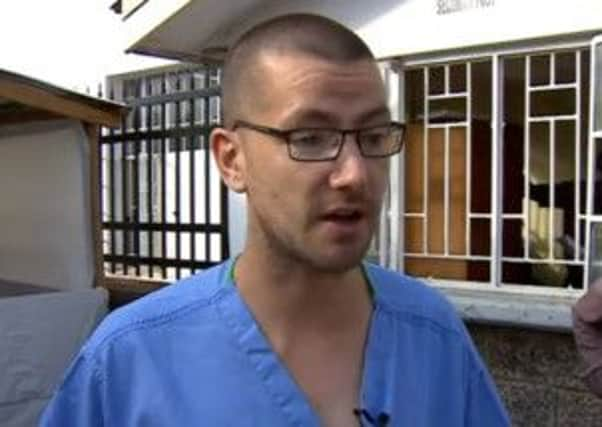UK Ebola survivor attacks world’s response


William Pooley, 29, became the first Briton to be infected with Ebola in August, before receiving life-saving treatment back in the UK.
Fully recovered – and potentially now with a degree of immunity – he has been back at the same West African treatment centre he worked in for a around a month.
Advertisement
Hide AdAdvertisement
Hide AdBut he said the international response to the deadly crisis remains “woefully slow”.
Discussing his return to the country where he caught the infection, Mr Pooley told the BBC “the biggest surprise was getting back here and seeing so many dead people”.
He described seeing up to ten bodies a day.
He said: “The response has been woefully slow. People don’t have any appreciation of the numbers of people, little kids that are dying because people are being too slow back in Europe and the States and elsewhere.”
The nurse described the circumstances at the Connaught Hospital where he is working in his second spell treating people infected by the deadly virus.
CONNECT WITH THE SCOTSMAN
• Subscribe to our daily newsletter (requires registration) and get the latest news, sport and business headlines delivered to your inbox every morning
“We’ve got one bed at the moment and there’s four suspects in the tent,” he said.
Mr Pooley said that staff were screening patients outside the hospital to avoid people suspected of Ebola going in.
“The thought of Christmas at home is great in some ways. But you’re not going to be able to switch off and enjoy your roast and relaxing with your family when you know what’s going on here. When you know what you should be doing.”
Advertisement
Hide AdAdvertisement
Hide AdMr Pooley, from Eyke in Suffolk, was flown back to the UK in August, where he was treated at the Royal Free Hospital in London.
He was treated with the experimental drug ZMapp and left hospital on 3 September after making a full recovery.
On leaving he said: “The real emergency is in West Africa, and the teams out there need all the support we can give them.”
He joined the King’s Health Partners team in October, a partnership between King’s College London and three NHS trusts – Guy’s and St Thomas’s, King’s College Hospital and South London and Maudsley.
More than 4,500 people have died from Ebola, mainly in Guinea, Liberia and Sierra Leone.
The Department for International Development announced earlier this month that it was releasing £1.34 million in a joint fund with the Wellcome Trust.
The funding will support five projects run by leading British and international researchers in a bid to improve evidence and understanding of the Ebola outbreak.
The UK, which has committed £125m to tackling Ebola, has put pressure on other wealthy countries to do more to combat the spread of the virus.
Advertisement
Hide AdAdvertisement
Hide AdIt emerged yesterday that a Cuban doctor treating patients had also tested positive for the disease.
Felix Baez, a specialist in internal medicine, showed signs of fever on Sunday and was confirmed as having the virus during tests at the main hospital in Freetown. He is to be flown for treatment in Geneva on the advice of the World Health Organisation, officials said.
SCOTSMAN TABLET AND IPHONE APPS